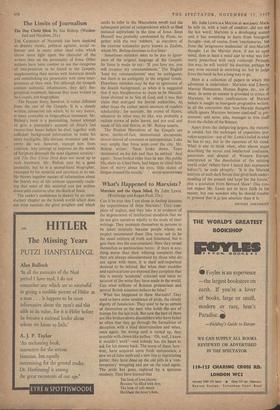What's Happened to Marxists ?
Marxism and the Open Mind. By John Lewis. (Routledge and Kegan Paul, 255.) CAN it be true that I am alone in finding tiresome the impertinence of these Marxists? They com- plain of neglect, and they take it as evidence of the degeneration of intellectual standards that we do not give ourselves wholly to the study of. their writings. They insinuate themselves as persons to be taken• seriously because people whom we respect recommend them (this turns out to be the usual mixture of truth and falsehood, but it gets them into the conversation). Here they reveal themselves as pertinacious bores: if there is any- thing worse than their whining complaint that they are always misunderstood by those who do not agree with them, it is their self-important demand to be refuted. But when their muddles and equivocations are exposed they complain that this is merely 'academic' criticism and takes no account of the noise they have made in the world. Can what millions of Russian proletarians and several British scientists believe be false?
What has happened to these Marxists? They used to have some semblance of pride, the cloudy dignity of fanaticism. They used to be as certain of themselves as the man who holds the ace of trumps for the last trick. But now the best of them are like broken-down dissemblers who have failed so often that they go through the formalities of deception with a tired determination and when, once again, the wrong card is turned up, they mumble with clown-like pathos : 'Oh, well, I knew it wouldn't work'—and nobody has the heart to ask for his money back. The worst of them, how- ever, have acquired some fresh testimonials, a new set of false teeth and a new line in ingratiating patter; they have done up the old pills in a 'con- temporary' wrapping and are on the road again. The pride has gone, replaced by a spurious modesty. They have learned that
The look of love alarms Because 'tis filled with fire; The look of soft deceit Shall in the lover's hire.
Mr. John Lewis is a Marxist de nos jours. Marx, he tells us, with a rush of candour, did not say the last word; Marxism is a developing science and it has something to learn from bourgeois thought—not, of course, from 'reactionaries,' but from the 'progressive tendencies' of non-Marxist thought. Let the Marxist show, if not an open mind, then at least a mind ajar to what was for- merly proscribed with such contempt. Perhaps, this way, he will 'enrich' his doctrine, perhaps he may even succeed in enriching us; but to judge from this book he has a long way to go.
Here is a collection of papers in which this adventure is undertaken : Marxism and Liberty, Marxist Humanism, Human Rights, etc., ten of them. In some an answer is provided to critics of Marxism; in others confirmation of Marxist beliefs is sought in bourgeois progressive writer: in all the conviction that 'non-Marxist thoughts which ignore Marxism become confused' is pre- eminent; and none, alas, manages to free itself from the clichés of the Science.
Apart from the disfiguring jargon, the rhetoric is candid, but the technique of exposition pro- vokes suspicion—not of Mr. Lewis's belief in what he has to say, but in the openness of his mind. What is' one to think when, after eleven pages describing the moral and intellectual confusion, pessimism and despair of Western Europe, interpreted as 'the dissolution of the existing world order' (where have I heard that expression before?), he ends abruptly: 'It is the Marxist analysis of such dark forces that gives both under- standing of the present and hope for the future„' plus a quotation from Bernard Shaw! One can- not expect Mr. Lewis not to have faith in his master, but one wonders why he should trouble to pretend that it,is less absolute than it is.
MICHAEL OAKESHOTE


































 Previous page
Previous page